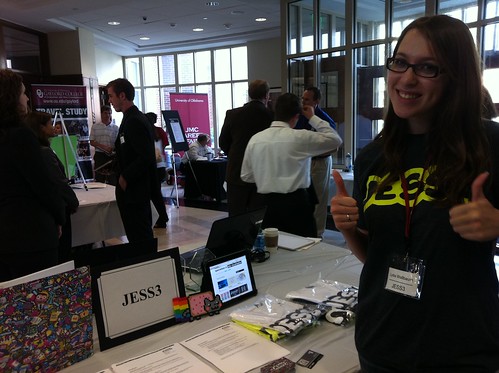If you’re on the prowl for a job, or are a current student on the cusp of graduating, this post is for YOU.
The last time I attended a “career fair” was when I was a freshman in college; even though I had just begun my collegiate journey, I was already eager to make it to the real world, and wanted to just get a taste. The whole thing just really felt insincere, chaotic and overall not very helpful.
Needless to say, I haven’t been back to one since … until yesterday.

This time, however, I was on the other side of the booth. This time, I was the employer looking for hot new talent, and I was determined to just be very straight-forward and as helpful as possible. Despite the event being held at my Alma mater’s longtime and utter rival university, I just kindly declined the crimson-colored lanyard, and instead pinned my name tag directly onto my cardigan, and ventured to our booth.

There’s no question that JESS3’s table was by far one of the most popular. I conducted a simple test by placing our Perler bead Nyan cat craft on the table — if someone recognized it, then they probably belonged at our booth.
As I said, my goal was to be real and to be helpful, which meant that I kept hearing myself tell people repeatedly that their goal should be to get their foot in the door. Some of these students, however, had other plans in mind. And while I commend them for their ambition, I wanted to also give them a swift kick of reality.
For example, here are a few disturbing conversations that keep haunting me:
CONVERSATION #1
Becca: “In terms of video production, we’d definitely be looking for production assistants to help on some of our motions projects.”
Student: “Yeah … I’m already doing that in a current internship.”
What I Wish I’d Heard From The Student: “I’m currently working as a PA at Company X. I’d love to learn what kind of responsibilities a PA at JESS3 has and find out what I could learn from or even contribute to that role at your company.”
CONVERSATION #2
Student: “Well, I’ve never been an Executive Producer on a project, and that’s what I’d really like to do.” (Implied: instead of what you’re describing to me)
What I Wish I’d Heard From The Student: “Well, I’ve never been an Executive Producer on a project, but I’ve supported in other roles, including X, Y, and Z. I’d love to learn more about how to work toward that role as a goal.”
CONVERSATION #3
Student: “So, will you just be in touch with me, then?”
Becca: “No. I’d go ahead and e-mail your resume and cover letter to me, and we can go from there.”
What I Wished I’d Heard From The Student: “I’m really interested in potentially joining the JESS3 Team and plan on emailing you my resume and cover letter today. I realize you must be very busy, so please let me know how I can best follow-up with you.”
Time after time and student after student kept giving me the impression that they aren’t looking to contribute to a workplace, they are instead looking for how the workplace can contribute to them. There’s something very wrong about this picture.
Sure, not every person that came by our booth had this mentality, but the majority did. I know that many of us have seen and even experienced first-hand these entitlement attitudes, but yesterday brought it to a new level for me. These students don’t realize what they are up against in this economy and in this industry.
It’s tough competition out there folks, don’t forget it!
So just to close things out, here are three tips straight to you from a hiring employer:
1. Start small in the right place. Look around, weigh your options. Once you have your sights set on a particular company, then take whatever opportunity you can get. Your far better off starting as a low man on the totem pole in a kick-ass agency, than an inflated title at a second-tier company.
2. Learn, learn and learn. When you land the job, don’t be afraid to ask questions about your role specifically and about how you integrate from others. Keep your ears to the ground, see how those around you operate: what methods prove productive, which ones counterproductive, what are traits you see your manager liking and disliking?
3. Make the most of it, down to every last drop. Seize the day in whatever job you have, execute at 110 percent and nothing less. I have far more respect for janitors or fast-food workers who do their job well and with a smile than a smug manager who not only doesn’t do his or her job well but also acts like s/he doesn’t have the time of day for me.
Tags: becca colbaugh, careers, jess3 okc, jobs
Join the Conversation